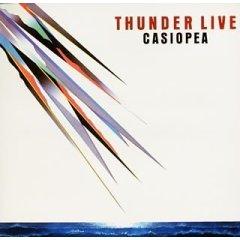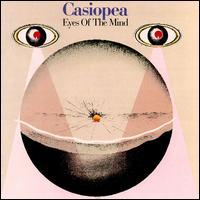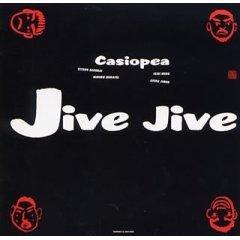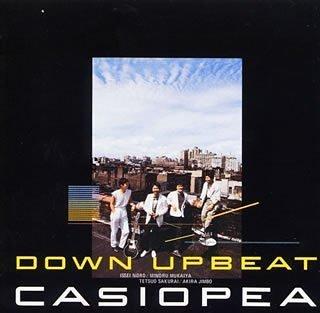
Casiopea, now known in its fourth iteration as Casiopea-P4, is a Japanese jazz fusion band formed in 1976 by guitarist Issei Noro, bassist Tetsuo Sakurai, drummer Tohru "Rika" Suzuki, and keyboardist Hidehiko Koike. In 1977, keyboardist Minoru Mukaiya and drummer Takashi Sasaki joined, replacing Koike and Suzuki. They recorded their debut album Casiopea (1979) with guest appearances by American jazz musicians Randy Brecker, Michael Brecker, and David Sanborn. In 1980, drummer Akira Jimbo joined the band. Casiopea has released over 40 albums in Japan and around the world.

Tetsuo Sakurai is a Japanese bassist. To date, he has released a total of 37 albums as a member of Casiopea and Jimsaku and solo artist, and has also made 3 bass instructional videos.

Casiopea is the debut album of Japanese jazz fusion group Casiopea, released on May 25, 1979. Recorded between December 1978 and March 1979 in Japan, it is Casiopea's self-titled debut album.

Thunder Live is the third album and first live album released by jazz fusion group Casiopea in 1980. This album marked the first appearance of drummer Akira Jimbo, who replaced Takashi Sasaki that same year.

Make Up City is the fourth album and the third studio album by Casiopea released on November 21, 1980.

Eyes of the Mind is the fifth album and the fourth studio album by Casiopea, released in 1981. The album was recorded in Los Angeles.

Cross Point is the sixth album and the fifth studio album by Casiopea recorded and released in 1981. This album is the first appearance of many Casiopea staple songs, like "Domino Line", "Galactic Funk", "Swear", and "Sunnyside Feelin'". Casiopea did a domestic tour after this album, which inspired the Mint Jams concert sessions.

Mint Jams is the seventh album and the second live album by Japanese jazz-fusion band Casiopea, released on May 21, 1982. The album's title is an arrangement of the band members' first and last initials.

4×4 - FOUR BY FOUR is the eighth album and sixth studio album by Casiopea recorded and released in 1982. Lee Ritenour, Harvey Mason, Nathan East, and Don Grusin participated in the recording of this album.

Photographs is the ninth album and the seventh studio album by Casiopea, recorded and released in 1983.

Jive Jive is the tenth album and the eighth studio album by Casiopea, recorded and released in 1983.

The Soundgraphy is the 11th album by Casiopea, recorded and released in 1984 in Japan. This is also Casiopea's first Compilation album.

Down Upbeat is the twelfth album and the ninth studio album by Casiopea, recorded and released in 1984.

Halle is the 13th album and 10th studio album by Casiopea released in 1985.
Casiopea Live is the third live album and first live video by Casiopea, released in 1985. This is also Casiopea's 14th album overall.

Sun Sun is the 15th album by Casiopea, recorded and released in 1986.

Casiopea Perfect Live II is the fourth live album and second live video released by the jazz fusion group Casiopea.
On February 25, 1987, it was released with a laser disc from laser disc Co., Ltd. 7" single record "Asian Dreamer" was distributed as the first board purchase privilege.
On July 10, 1987, it became an LP record from Alfa Records.
In 2000, it was recurred as DVD "CASIOPEA LIVE HISTORY PART-I". Finally, as an exclusive add-on, Issei Noro interview was added.
This is contains tour final concert at U-Port hall that was Cassiopeia’s tenth anniversary tour.

Euphony is the 18th album released by the jazz fusion group Casiopea in 1988.

Casiopea World Live '88 is the fifth live album released by the jazz fusion group Casiopea in 1988. It is a compilation Album consisting of recordings of some of their songs played in concert during Casiopea's World Tour in 1988 that promoted their previous album "Euphony". It is also a collaboration album with two Japanese horn sections from two other bands, the brass section of "Spectrum" and the brass Section of "The Tops". Additionally, it is the first album Spectrum recorded since their breakup in 1981, and is their penultimate album. Lead trumpeter/vocalist of Spectrum, Ichiro Nitta, was also the Producer of "The Tops" at the time this album was released. Tops released one more album, "Soul Children", the following year, before they disbanded in 1991. This was also the last album to feature Tetsuo Sakurai on Bass and Akira Jimbo on Drums, who both left to form the band Jimsaku.

20th is the seventh live album by the jazz fusion group Casiopea released in 2000. This is a live recording of the 20th anniversary of Casiopea and their thirty-third album overall. This is also their first live album since the release of Made in Melbourne and We Want More in 1992.



















